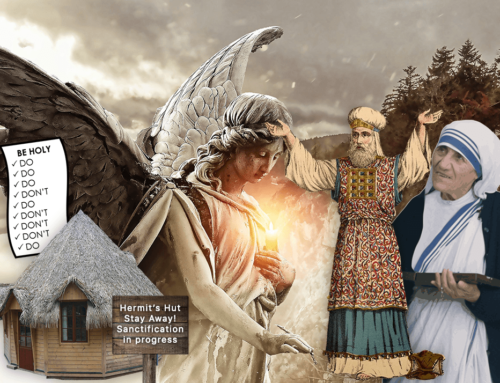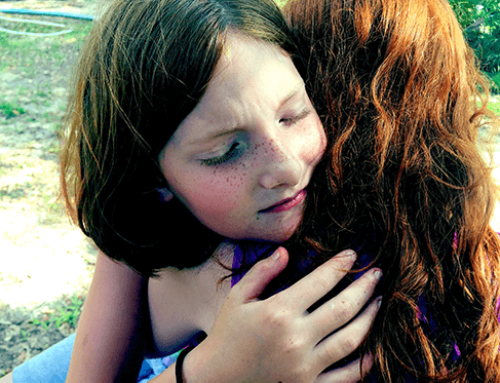
Child survivors of Auschwitz
At the end of World War II, the Allies entered the concentration camps of Germany to find unbelievable carnage. Among the masses of emaciated bodies, the following note was found in the clothing of a dead child. It reads:
O Lord, remember not only the men and woman of good will, but also those of ill will. But do not remember all of the suffering they have inflicted upon us: Instead remember the fruits we have borne because of this suffering, our fellowship, our loyalty to one another, our humility, our courage, our generosity, the greatness of heart that has grown from this trouble. When our persecutors come to be judged by you, let all of these fruits that we have borne be their forgiveness.
Forgiveness. It is a miracle that a child suffering in such a place could experience the blessing of forgiveness.
Throughout Jesus’ ministry, the issue of forgiveness was repeatedly brought forth into the light. Early in his ministry Jesus taught the disciples to pray (Matthew 6:9-13). We are all familiar with the words:
(9) Our Father who is in heaven,
Hallowed be Your name.
(10) ‘Your kingdom come.
Your will be done,
On earth as it is in heaven.
(11) ‘Give us this day our daily bread.
(12) ‘And forgive us our debts, as we also have forgiven our debtors.
(13) ‘And do not lead us into temptation, but deliver us from evil.
According to the Gospel of Matthew, Jesus took a moment after this prayer, to elaborate on one point. Do you know what He said? He focused in on forgiveness and said,
(14) For if you forgive others for their transgressions, your heavenly Father will also forgive you.
(15) “But if you do not forgive others, then your Father will not forgive your transgressions.
Most of us wrestle with forgiveness. If you have a hard time with it, you are not alone.
Jesus made the point, more than once, that forgiveness, or the lack of it, is often a key issue in our suffering. When a paralytic man was brought to Jesus for healing, his response to the man was, “Your sins are forgiven.” It was not for the benefit of the paralytic man, but because of the unbelief of the onlookers that he added, “Get up, pick up your bed and go home.” (Matt. 9:2-8)
Why would Jesus tell a man his sins were forgiven when his friends brought Him for physical healing? Because Jesus knew that for this man, forgiveness would lead to his healing both spiritually and physically.
Have you ever wrestled with the question of forgiveness? Have you ever wrestled with what it means to be forgiven? Do you ever have difficulty forgiving others? You are in good company.
The Apostle Peter wrestled with these questions. In Matthew chapter 18:21-22, Peter tried to pin Jesus down on exactly what He meant about forgiving others. He wanted details. He wanted it all spelled out. Surely there must be a limit! Surely there must be a point at which we draw a boundary and say, “No more!”
Peter asked Jesus, “Lord, how often shall my brother sin against me and I forgive him? Up to seven times?” Peter thought he was being generous. In fact, he may have been referring to something else Jesus had said about forgiveness. We read in Luke 17:3-4, “If your brother sins, rebuke him; and if he repents, forgive him. And if he sins against you seven times a day, and returns to you seven times, saying, ‘I repent,’ forgive him.” Wow, seven times in one day! Surely that must be the limit of what we have to endure! But Jesus answered Peter and said, “No, I didn’t mean for you to just count up to seven times and make that the limit of your forgiveness. Make it seventy times seven!” (Matt. 18:22 paraphrase) In other words, don’t stop! Keep on forgiving!
Now, Jesus knew we would have a hard time with this. And so He told a parable to help us understand. Turn with me to Matthew chapter 18, beginning with verse 23 (23-35).
Matt. 18:23 “For this reason the kingdom of heaven may be compared to a king who wished to settle accounts with his slaves. 24 “When he had begun to settle them, one who owed him ten thousand talents was brought to him. 25 “But since he did not have the means to repay, his lord commanded him to be sold, along with his wife and children and all that he had, and repayment to be made. 26 “So the slave fell to the ground and prostrated himself before him, saying, ‘Have patience with me and I will repay you everything.’ 27 “And the lord of that slave felt compassion and released him and forgave him the debt. 28 “But that slave went out and found one of his fellow slaves who owed him a hundred denarii; and he seized him and began to choke him, saying, ‘Pay back what you owe.’ 29 “So his fellow slave fell to the ground and began to plead with him, saying, ‘Have patience with me and I will repay you.’ 30 “But he was unwilling and went and threw him in prison until he should pay back what was owed. 31 “So when his fellow slaves saw what had happened, they were deeply grieved and came and reported to their lord all that had happened. 32 “Then summoning him, his lord said to him, ‘You wicked slave, I forgave you all that debt because you pleaded with me. 33 ‘Should you not also have had mercy on your fellow slave, in the same way that I had mercy on you?’ 34 “And his lord, moved with anger, handed him over to the torturers until he should repay all that was owed him. 35 “My heavenly Father will also do the same to you, if each of you does not forgive his brother from your heart.” (NASB)
I want to look at this parable in two parts. First I want to consider the slave and his debt to his master. Second I want to consider the slave and the debt owed him by his fellow slave.
So, what was the relationship between the master and his slave? This was no ordinary master. This was not a simple employer–employee, or a common master-slave kind of relationship. This master was a king!
What about the debt? How much did this slave owe? How much is 10,000 talents? Well, one talent was considered to be worth about 9 man-years of skilled labor or about 6,000 drachma. One drachma was considered to be a fair day’s wage for the common laborer. So, the equivalent of this slave’s debt, if he were working in the United States at today’s minimum wage, is about 3.96 billion dollars.
3.9 BILLION dollars! This was no ordinary debt! Verse 25 says the slave “didn’t have the means to repay.” Well, how could he? How could an ordinary slave repay a debt of that magnitude? In verses 26-27 we read, “So the slave fell to the ground and prostrated himself before [his master], saying, ‘Have patience with me and I will repay you everything.’ And the lord of that slave felt compassion and released him and forgave him the debt.” Seriously, does the master believe this slave would ever be able to repay the debt that he owes? Of course not! He could not possibly repay this debt, no matter how long the master might wait patiently for him to try! But the master had compassion on him and forgave him his debt.
This is a picture of God and me… or of God and you. We are that slave and God is our Master. We owe Him a debt that we could never repay. And when we come before Him, confessing that we could never repay the debt we owe, throwing ourselves on His mercy, He has compassion on us and forgives us. Why? Because Jesus became a man and died on the cross for you and me. Jesus paid the debt we could never repay. And when we ask, he applies Jesus’ payment to our account and our debt is wiped clean!
Colossians 2:13-14 says,
When you were dead in your transgressions… He made you alive together with [Jesus Christ], having forgiven us all our transgressions, having canceled out the certificate of debt consisting of decrees against us, which was hostile to us; and He has taken it out of the way, having nailed it to the cross.
Our debt is greater than we can imagine. But through Jesus Christ our debt is cancelled. Our account is wiped clean.
Now let’s look at the next part of the story. This slave who has been forgiven so much goes to his fellow slave and is unwilling to forgive him his debt. How much does this man owe? Verse 28 said the amount was 100 denarii. Denarius is the Roman name for the Greek drachma, which we already learned was considered to be a fair day’s wage for a skilled laborer. So using the same minimum wage figure, this debt added up to about $6,600. Well, for most of us that is more than a trifling amount. But how does it compare to the debt this man had been forgiven by his master? It is ridiculously small in comparison–roughly something in the neighborhood of 1/10,000th of 1% of the debt he had owed!
When the master heard what his slave had done, He summoned him into his presence and said, “You wicked slave, I forgave you all that debt because you pleaded with me. Should you not also have had mercy on your fellow slave, in the same way that I had mercy on you?”
The master was angry. And what did he do? He handed his slave over to the torturers until the debt should be paid!
Now, at this point Jesus made a startling statement. Verse 35 reads, “My heavenly Father will also do the same to you, if each of you does not forgive his brother from your heart.” What will God do if we do not forgive others? He will hand us over to the torturers until the debt is paid! What debt? I believe Jesus is referring to the debt for which we are being handed over – failure to forgive from your heart!
You may be thinking, “You can’t possibly think that a loving God would torture me for not forgiving someone!” Well, the Scripture doesn’t say He will torture you, but it does say He will “hand you over.” Hand you over to what? To the consequences of your unforgiveness.
What exactly are the consequences of unforgiveness? How about regret, pain, anger, bitterness, damaged relationships… Unforgiveness is like a dirty, untreated wound that continues to fester and spread until it tortures you with constant pain.
After the end of World War II, Corrie Ten Boom had a home in Holland for victims of Nazi brutality. She tells of witnessing daily the effects of unforgiveness in the lives of the victims. She said, “Those who were able to forgive their former enemies were able also to return to the outside world and rebuild their lives, no matter what the physical scars. Those who nursed their bitterness remained invalids. It was as simple and horrible as that.” (Tramp for the Lord, 55)
Karl Menninger, a famous psychiatrist was once quoted as saying that, “If he could convince the patients in psychiatric hospitals that their sins were forgiven, 75 percent of them could walk out the next day!” (Today in the Word, March 1989, p. 8.)
Refusing to forgive has awful and far-reaching consequences. The good news is, every dark place that has been tortured by unforgiveness can be healed and cleansed as it is brought into the light of forgiveness.
Corrie Ten Boom writes, “Forgiveness is the key which unlocks the door of resentment and the handcuffs of hatred. It breaks the chains of bitterness and the shackles of selfishness. The forgiveness of Jesus not only takes away our sins, it makes them as if they have never been.” (183)
Corrie had experienced first hand the miracle of forgiveness in her life: both in her relationship with God and, with God’s help, in her relationships with others.
We often talk about forgiveness only from the perspective of removing debt, of cleansing away the guilt of sin. But I believe there is much more to forgiveness than removing a debt. And I believe that is why God insisted that we must forgive others if we want Him to forgive us.
I want to propose to you three aspects of forgiveness:
- Removal of Debt (which the Bible also calls Justification)
- Restoration of Relationship (which the Bible describes as Reconciliation), and
- Healing of Wounds (which is often referred to as Cleansing)
- Forgiveness as the removal of debt is beautifully illustrated in our parable when the master had compassion and forgave his slave of that enormous debt he could never conceivably repay. This is the debt that was paid for us by Jesus on the cross. When you come humbly to God, confessing to Him that you owe a debt to Him you could never repay, and when you ask His forgiveness – He will forgive you because of what Jesus did on the cross. There is nothing you can do to earn this forgiveness, it is freely given to all who ask in faith.
-
Forgiveness as the restoration of relationship occurs in our relationship with God at the moment we ask His forgiveness.
-
We also experience the healing power of forgiveness at the moment we ask for God’s forgiveness.
But what happens when, having once believed and received God’s forgiveness, you sin and disrupt your relationship with God. Do you owe the debt once more? No, the debt has been paid long ago by Jesus Christ on the cross. So then, were only some of your sins forgiven before? And now the debt for these new sins must be paid as well? No! Colossians 2:13 says God made you alive together with Jesus Christ, having forgiven you ALL your sins. So what forgiveness do you need? You need the forgiveness that restores your relationship with God and you need the cleansing and healing power of forgiveness to deal with the pain and anger that may have taken root in your heart.
Why then must we forgive others? Why does God consider this so critical that He would hand you over to “torture” until you forgive from your heart?
Well, we certainly do not forgive others to remove the guilt of their sin. We cannot do that for them anymore than we can do it for ourselves. Only God can forgive the guilt of sin.
We must forgive in order for relationships to be restored. It is not only the relationship with that person from whom we have withheld forgiveness that is affected, but many of our relationships, including our relationships with God and with those we love most, that are affected when we choose not to forgive. Restoration of relationships can begin when there is forgiveness from the heart.
We must also forgive in order for healing to begin in our own hearts. Healing of the regrets, the anger, the bitterness, and the pain caused by the deep wounds which we were originally unable or unwilling to forgive.
Now, some of you may be thinking this all sounds good, but I can’t do it. I can’t bring myself to forgive. I have tried, but I can’t do it and I’m not even sure I want to. Let me share something with you.
In 1980, a young woman named Faith Hathaway was raped and murdered in Louisiana. Her killer, Robert Willie, and an accomplice kidnapped a 16-year-old girl named Debbie, and her boyfriend, Mark. They tortured Mark and shot him in the head, leaving him for dead. Then they took Debbie and over the next 30 hours repeatedly raped her and threatened to kill her. Unexplainable without the intervention of God, they let her go. Debbie’s testimony was instrumental in the conviction of Robert Willie, whose death row story was told in the book and movie, Dead Man Walking. Eventually, God helped Debbie Morris break through the pain of her ordeal through the healing power of forgiveness, a story she tells in her own book, Forgiving the Dead Man Walking.
If you think you cannot forgive, listen to Debbie’s words:
[People ask me] “How can you forgive someone like Robert Willie?” …to anyone whose life has been impacted by some horrible wrong… [let me share the words of Lewis Smeades,] “If we say monsters are beyond forgiving, we give them a power they should never have. Monsters who are too evil to be forgiven get a stranglehold on their victims; they can sentence their victims to a lifetime of unhealed pain. If they are unforgiveable monsters, they are given power to keep their evil alive in the hearts of those who suffered most.” (248)
[People ask me] ‘What if I can’t forgive?’ When people ask me that, what they often mean is, ‘What if I’m not yet ready or willing to forgive?’
“Much, if not most, of the time our reluctance to forgive is based on the false assumption that forgiving means giving in or giving up something valuable. We think it might mean granting the other person some reward he doesn’t deserve. Or completely discounting the wrong committed–as if it never happened.
“But that’s not how forgiveness works. By forgiving Robert Willie, I in no way absolved him of his responsibility for what he did to me, to Mark, to Faith Hathaway, or to anyone else. He has to answer for that… forgiveness isn’t giving him [something] he doesn’t deserve; he gains nothing from it.
“However, the refusal to forgive him always meant that I held onto all my Robert Willie-related stuff–my pain, my shame, my self-pity. That’s what I gave up in forgiving him. And it wasn’t until I did, that real healing could even begin.
“I was the one who gained.” (249-250)
“For so many years my reluctance to forgive was like a darkness inside, a barrier that barred joy and love and so many good things from my life. Forgiveness smashed that barrier and has enabled me to experience the giving and the receiving of love again.” (250)
Is unforgiveness like a darkness inside you? Are you in torment from regret or from the anger and pain of unforgiven hurts? Is there someone who has hurt you? Is there someone you need to forgive? Forgiveness is not an emotion, it is an act of the will: a step of obedience we take in faith, trusting that God will supply what we are not able to. You not only should forgive, but you must forgive. And God’s grace will supply all that you need to obey what He commands you to do.
If today, you need the forgiveness of God for that unimaginable debt you could never pay, act now and ask for His mercy. He will forgive you!
If today you have the pain of unforgiveness torturing your heart and life, respond now in obedience to God. Choose to forgive that person, choose to forgive yourself. God has forgiven you, you can also forgive. The guilt of that sin is God’s to forgive, not yours. God will see that justice is done, that’s His job. Your job is to forgive from your heart so that healing can begin.
Pastor Cindy
[Adapted from a sermon originally preached July 31, 2011.]





Wow, that’s a lot to “chew on”. I have struggled alot with unforgiveness in my life. But I have learned much along the way about putting myself in the other person’s shoes and I “get over myself” much quicker than I used to.